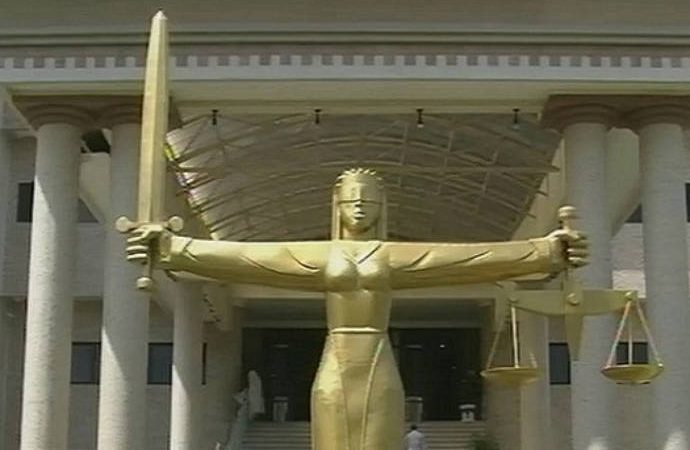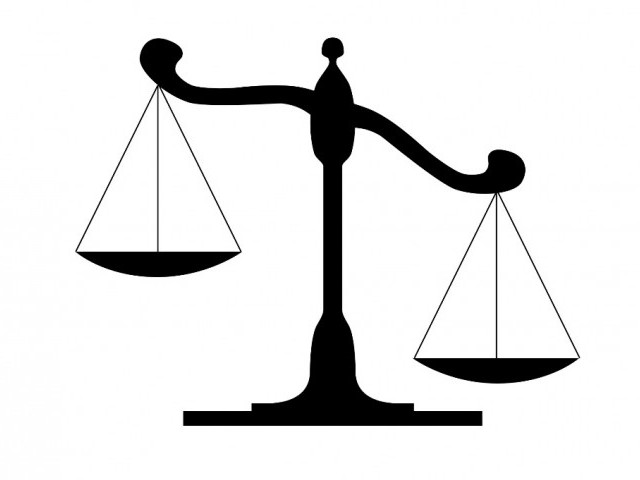Why We Oppose Re-ordering Of 2019 Election Sequence, AGF, INEC Tell Court
The Abuja Division of the Federal High Court, on Monday, fixed April 25 to deliver judgment on the suit challenging the powers of the National Assembly to re-order the sequence for the 2019 general elections.
Justice Ahmed Mohammed reserved judgment on the matter after all the parties argued and adopted their respective briefs of argument pertaining to the suit that was filed by Accord Party.
Both the Attorney General of the Federation and Minister of Justice, Mr. Abubakar Malami, and the Independent National Electoral Commission, INEC, adduced reasons why the court should not allow the NASS to tamper with the already released sequence for the forthcoming general elections.
This was even as the NASS, through its lead counsel, Mr. Joseph Daudu, SAN, queried the jurisdiction of the court to stop it from securing two-third majority to override President Muhammadu Buhari’s refusal to assent to the Electoral Act Amendment Bill, 2018, which altered the election sequence.
The NASS equally challenged the locus-standi of the plaintiff to institute the action, noting that it failed to tender its Certificate of Registration to enable the court to confirm that it is a genuine political party.
However, the AGF and INEC’s lawyer, Mr. Femi Falana, SAN, had while adopting their processes, insisted that sections 78(1), 116, 132, 153, 178 and item 15 to the Third Schedule of the 1999 constitution, as amended, gave the electoral body unfettered discretion to the choice of date for elections.
The AGF and INEC who were cited as 2nd and 3rd defendants in the suit, said they were in support of all the reliefs being sought by the plaintiff, contending that section 4(8) of the constitution conferred the court with requisite jurisdiction to stop the NASS.
Malami said: “My lord the 2nd defendant has filed friendly process to the case of the plaintiff. I call the process friendly in the sense that we did not file any objection to the Originating Summons.
“Arising further with the case and position of the plaintiff, we most humbly adopt their submissions in totality. We oppose the preliminary objection filed by the 1st defendant (NASS).
“For the purpose of determining whether the jurisdiction of this court can be properly invoked or otherwise, I submit that what is before your lordship for consideration, is a legislative conduct that is constitutionally recognised .
“Section 4(8) of the 1999 constitution is express and categorical as far as the invocation of the jurisdiction of this court is concerned. This court has the power to invoke its jurisdiction when the question borders on the issue of legislative powers of the NASS”
He argued under section 58 of the constitution, such legislative powers included the passing of Bills by both the Senate and House of Reps
. “Once a Bill is passed by the NASS, the logical conclusion is that the legislative power envisaged in section 4(8) are consummated and whole-heartedly concluded by the NASS, thereby properly invoking the jurisdiction of the court”, “Issue concerning the powers of INEC to fix dates for election had long been settled by the Supreme Court in NASS vs President, 2003, 9-NWLR, part 824, page 104.
“The 3rd defendant has issued and released a time table for the conduct of the 2019 election, an action the the 1st defendant is seeking to legislate on. We submit that this is not practicable since the action of INEC is sacrosanct having been clothed with statutory protection”, Malami argued.
On his part, Falana accused the NASS of attempting to place the Electoral Act above the constitution.
He said: “My lord what the NASS has done is to say that four sections of the constitution that has to do with powers of INEC to conduct/fix date for elections, be made subject to the Amended Electoral Act.
“It is our submission that the constitution cannot be made subject to any Act. It is unheard of. On the issue of locus standi, we can confirm that we registered the plaintiff as Accord.
“It applied to us and all their documents, certified, has been exhibited by the plaintiff as exhibit 4 to 8.This plaintiff was registered as Accord and it won seats, with their representatives currently sitting in the chambers of the 1st defendant. “It is therefore our submission that the plaintiff has the jurisdiction to file this suit which fall under public interest litigation.
“We urge my lord to exercise its discretion and grant the reliefs as sought by the plaintiff. We shall however ask for cost if they win, for bringing us here”.
Earlier, counsel to the plaintiff, Chief Wole Olanipekun, SAN, argued that even if NASS was allowed to re-order the election sequence, he said INEC has the power to postpone the National Assembly election and conduct the presidential first.
“Can it then be contended by any of the parties that the elections are illegal because INEC postponed the first one in the sequence?”, Olanipekun queried.
He argued that 26(1) of the Electoral Act which gave INEC the power to postpone election has not been amended or repealed.
Olanipekun told the court that former President Goodluck Jonathan had few days before he vacated office, also refused to sign the Constitution Alteration Bill into law.
He said following a suit by the AGF, the Supreme court, on May 7, 2016, restrained the NASS from exercising any further power under section 58(5) of the constitution with a view to passing the bill with 23rd majority since the President had declined his assent.
The defendant argued that the suit has become academic since the President has already declined his asset to the bill. Nevertheless, the NASS, in its preliminary objection, urged the court to dismiss the suit which it said was academic and inchoate. He argued that internal workings of the NASS are not justiceable.
“However not to lose sight of the main issue. The question is whether what is being challenged is a Bill or an Act of the National Assembly. “No matter how it is stretched or construed, the Electoral Act Amendment Bill 2018, was as at the date of filing of this suit, till today, a Bill. My lord it becomes an Act upon the happening of two eventualities.
“Where the President acting under provisions of section 58(4), assents to the Bill, then it becomes an Act of the NASS. “Where he refuses to assent under section 58(5) the Bill is returned to the NASS for use of their veto to override. At that point in time, it continues to become a Bill because there is no guarantee that the will gather the sufficient number to transform the Bill into an Act.
“However, if they are successful in gathering the required signatures in accordance with democratic wish of the people, then it becomes an Act. It is only at that stage that the jurisdiction of the court is ignited under section 1(3) of the 1999 constitution. “It is our position that this action is inchoate and academic.
The Bill is still there for the NASS to act on it according to their own scheme of things”, Daudu added.
After he had listened to all the parties, Justice Mohammed adjourned the case for judgment.
It will be recalled that Accord Party is in its suit marked FHC/ABJ/CS/232/2018, posed nine questions for the court to determine, among which included whether, “Having regard to the combined provisions of section 79, 116, 118, 132, 153, 160(1) and 178 of the Constitution of the Federal Republic of Nigeria, 1999, as amended, read together with paragraph 15(a) of the Third Schedule to the same Constitution, whether the 3rd defendant is not only institution or body constitutionally vested with the powers and vires to organise, undertake and supervise elections to the offices of the President and Vice President of the Federal Republic of Nigeria, the Governor and Deputy Governor of a State, membership of the Senate, the House of Representatives and the House of Assembly of each State of the federation, including fixing the sequence and dates of the elections to the said offices?
Upon determination of the questions, the plaintiff sought 10 principal reliefs, including; “A declaration that the 3rd defendant is the only body and or institution constitutionally vested with the powers, vires and duties to organise, undertake and supervise elections to the offices of the President and Vice President of the Federal Republic of Nigeria, the Governor and Deputy Governor of a State, membership of the Senate, the House of Representatives and the House of Assembly of each State of the Federation, including fixing or assigning dates of the said elections and sequence of same.
“A declaration that the legislative powers vested in the 1st defendant by the constitution do not empower or imbue it with the right, liberty or authority to pass or purport to pass any Bill into Law which attempts to interfere with or undermine the independence of the 3rd defendant, as guaranteed by the content, spirit and tenor of the constitution.
“A declaration that the Electoral Act Amendment Bill, 2018, passed by the 1st defendant, particularly clause 25” thereof, which directs, commands and mandates the 3rd defendant to follow a particular sequence of election into the offices of President and Vice President of the Federal Republic of Nigeria, the Governor and Deputy Governor of a State, membership of the Senate, the House of Representatives and the House of Assembly of each State of the Federation as provided in the said amendment, is unconstitutional, illegal, ultra vires, null and void, and of no effect whatsoever.
“A declaration that by section 153(1)(f) and item 15(a) of the Third Schedule to the Constitution of the Federal Republic of Nigeria 1999 (as amended), the order or sequence of holding the general election is already prescribed such that election to the offices of President and Vice President come first, while elections to other offices follow in the said prescribed order.
“A declaration that the amendment to the Electoral Act, 2010 just passed by the National Assembly prescribing the sequence or order in which elections to the office of President and Vice President of the Federal Republic of Nigeria, the Governor and Deputy Governor of a State, membership of the Senate, the House of Representatives and the House of Assembly of each State of the federation should take place, coming as it were after the 3rd Defendant had released or published its time table and order of election into the offices aforesaid cannot apply to 2019 general elections.
“A declaration that having regard to the fact that the (i) Provisions of sections 76(2), 116(2), 132(2) and 178(2) of the Constitution of the Federal Republic of Nigeria, 1999 (as amended) which mandatorily prescribes the holding of elections to the various offices of National Assembly, State Houses of Assembly, President, Vice President, State Governors and Deputy Governors respectively, to be held on a date not earlier than One Hundred and Fifty days and not later than Thirty days before the expiration of the term of office of the last holder of that office; (ii ) Current National Assembly and various State Houses of Assembly were constituted on 9th of June, 2015 and their tenures will expire and stand dissolved on the 8th of June, 2019; and (iii ) Present/current President, Vice President, Governors and Deputy Governors of all the States of the federation (except Anambra, Bayelsa, Kogi, Edo, Ondo, Ekiti and Osun States) came into office on 29th day of May, 2015, and their tenure will expire on 28th day of May, 2019; “The amendment to the Electoral Act, 2010 (introducing a new Clause 25) just passed by the National Assembly which prescribes the sequence/order in which the general elections into the offices of President and Vice President of the Federal Republic of Nigeria, the Governor and Deputy Governor of a State, membership of the Senate, the House of Representatives and the House of Assembly of each State of the federation should take place is in conflict, or has interfered or curtailed the power, right and discretion of the Independent National Electoral Commission (INEC) generally and in particular, in respect of the schedule or sequence of 2019 general election.




